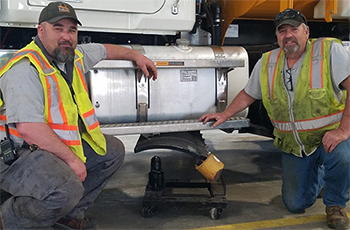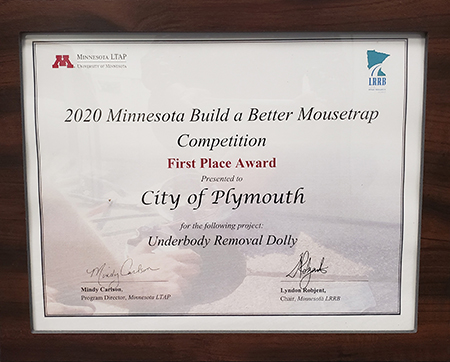September Update: The story was featured on the front page of the September 2020 issue of the statewide University of Minnesota Technology Exchange newsletter. View the University of Minnesota newsletter (PDF)

Two City of Plymouth employees recently earned statewide recognition for inventing a safer and more efficient way to remove and transport snow plow blades.
Congratulations to Plymouth Street Maintenance Workers Harry Stricklen and Mark Sauter. With the invention, the duo took first place in the “Build a Better Mousetrap Competition,” sponsored by the University of Minnesota’s LTAP (Local Technical Assistance Program).
The competition offers applicants the opportunity to showcase an innovative gadget or improved job process they’ve invented in order to solve a problem.
Snow plow blades are very heavy – and taking them on and off the trucks is dangerous. With installed cutting edges (replaceable blade edges to cut through snow and ice), an underbody snow plow blade typically weighs about 1,200 pounds.
 To make it easier, Stricklen and Sauter’s invention involved fabricating a dolly with bottle jack system to lower the underbody snow plow blades and more easily transport them.
To make it easier, Stricklen and Sauter’s invention involved fabricating a dolly with bottle jack system to lower the underbody snow plow blades and more easily transport them.
Before the invention, it took about an hour and a half, and a crew of three, to put each truck on lifts to remove and transport the underbody. Thanks to Stricklen and Sauter, it takes half the time with less people and the truck no longer needs to be hoisted up on lifts. It also reduces the risk of injury.
A collaborative effort of the Minnesota Local Road Research Board, the Federal Highway Administration and the Minnesota Department of Transportation, Minnesota LTAP is housed at the University of Minnesota within the Center for Transportation Studies.
Minnesota LTAP frequently partners with other agencies, industry groups and professional organizations to help lower costs and reduce duplication of effort, as well as provide better quality training for Minnesota's local government agencies.
Congratulations to Stricklen and Sauter for winning the award – and big kudos for the ingenuity!